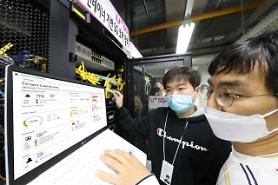
[Courtesy of KT]
SEOUL -- KT, a major telecom company in South Korea, launched a trial service for 5G standalone following the establishment of an integrated core network that can accommodate standalone technology without installing new equipment. Standalone services can be realized only by upgrading software for non-standalone core equipment.
South Korea has pushed hard for the rollout of a 5G network that can improve efficiency in massive data traffic and enable ultra-low latency and much higher capacity without resorting to 4G infrastructure. In 2019, KT and other domestic companies commercialized 5G mobile networks based on non-standalone (NSA) standards, using 4G infrastructure before switching to 5G standalone (SA).
The transition to SA services requires voice calls and stable data communication functions. Voice calls will be provided using evolved packet system (EPS) fallback technology, an evolved packet system that provides voice services based on smooth signal processing between 5G and LTE.
"Starting with a service for customers, KT will evolve its 5G standalone network into a true 5G platform that can integrate with other industries," KT's network division head Lee Cheol-gyu said. KT will test stable communication quality by applying its own EPS Fallback technology.
KT has successfully verified the on-site transmission of data from a self-driving vehicle and a base station using the frequency of 28GHz bandwidth. The 28GHz-based 5G network will make data transmission speed faster especially in areas where traffic is concentrated, such as stadiums and large shopping malls. Essential network services for self-driving cars will be safer.
KT has also developed an open 5G beam-forming base station in the 28GHz band through cooperation with Movandi, a U.S. 5G startup. Beam-forming focuses power to desired users to form beams, expand coverage and increase speed in the 28GHz band.
Other companies have completed preparations for 5G SA services. SK Telecom has applied technologies such as international standard-style network slicing and mobile edge computing (MEC), which provides ultra-low delay and high-speed services regardless of physical distance.
KT said the establishment of an individual 5G network will activate future growth businesses such as smart factories, smart hospitals and autonomous driving while improving the quality of augmented reality, virtual reality and cloud games. Network slicing technology allows corporate customers to develop various services more easily and quickly.
Copyright ⓒ Aju Press All rights reserved.



